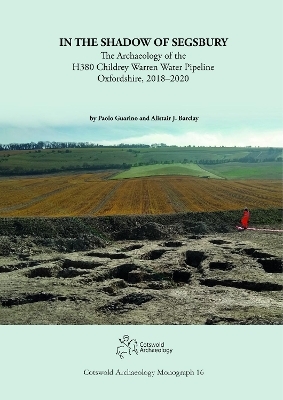
In the Shadow of Segsbury
Cotswold Archaeology (Verlag)
9781999822224 (ISBN)
Extensively illustrated report on an excavation in Oxfordshire near the Iron Age hillfort at Segsbury. Ephemeral traces of Mesolithic and Neolithic activity, including a possible Neolithic timber structure, were found. The remains of a probable Late Bronze Age pit alignment were also found. Small Iron Age settlements comprising round houses, pits and other structures, and burials were revealed. One particular burial in a pit had been subjected to unusual treatment that included the removal of the individual’s feet after death. Small Roman and post-Roman cemeteries also were identified. The small Late Roman cemetery included males, females and neonates. This cemetery is typical for the period and the burials were accompanied by a range of artefacts including coins, brooches, a bracelet and rings as well as an unusual fragmentary double-sided bone or antler comb with a horse motif and ring-and-dot decoration. A small undated cemetery was originally believed to be either of Roman or less likely post-Roman date. However, radiocarbon dating revealed the unaccompanied burials to be of late 7th or early 8th century AD date. Innovative scientific techniques including radiocarbon dating and Bayesian modelling, aDNA and isotope analysis have revealed some important details such as familial relationships and dating that would not otherwise have been known. Small assemblages of finds included worked flint and prehistoric pottery, Roman and later pottery, worked bone, glass and metalwork.
Paolo is an Assistant Post-Excavation Manager at Cotswold Archaeology (Kemble). He has worked in British commercial archaeology for 20 years, directing projects in Southern England as well as Italy and Turkey. His academic interest include social complexity/inequality in prehistoric Turkey and Mesopotamia, and has published a number of articles. Alistair is the Principal Post-Excavation Manager (Andover) and deals with all aspects of post-excavation and publication. He is an authority on prehistoric pottery, chronology and monuments, and has authored over a dozen books and monographs, and numerous research articles)
List of Figures
List of Tables
Acknowledgments
Summary
Prologue
Chapter 1 Introduction
Chapter 2 Excavation results – early prehistoric: Mesolithic to Late Bronze Age
Chapter 3 Excavation results – later prehistoric, Roman and Saxon
Chapter 5 Artefacts
Chapter 6 Environmental evidence
Chapter 7 Discussion
Bibliography
Appendix 1 Summary of storage pits
Index
| Erscheinungsdatum | 30.09.2023 |
|---|---|
| Zusatzinfo | 136 Black and white and colour line drawings and photographs |
| Verlagsort | Cirencester |
| Sprache | englisch |
| Maße | 210 x 297 mm |
| Themenwelt | Geisteswissenschaften ► Archäologie |
| Geschichte ► Allgemeine Geschichte ► Vor- und Frühgeschichte | |
| ISBN-13 | 9781999822224 / 9781999822224 |
| Zustand | Neuware |
| Informationen gemäß Produktsicherheitsverordnung (GPSR) | |
| Haben Sie eine Frage zum Produkt? |
aus dem Bereich


